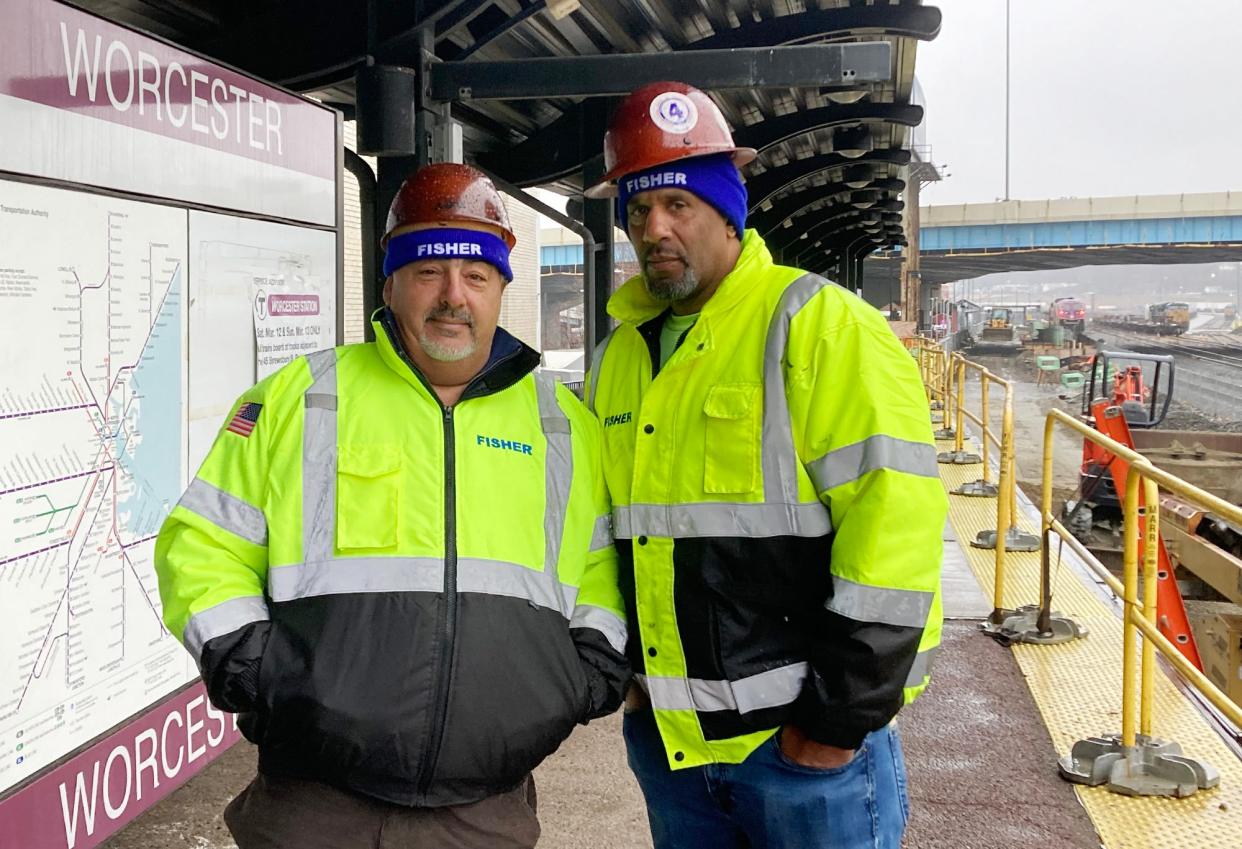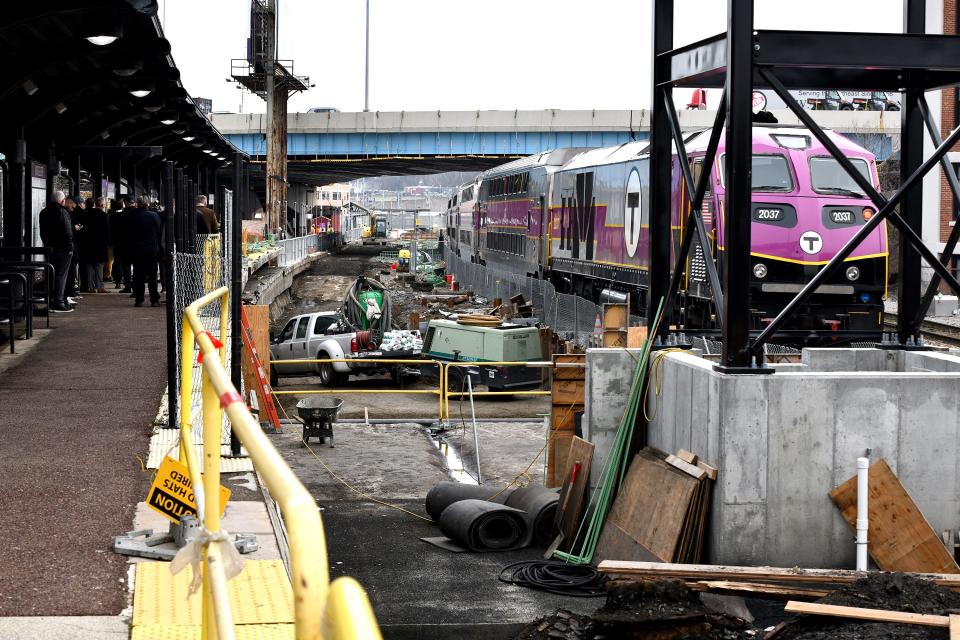Politics and the City: Minority-owned businesses on track with Union Station project

WORCESTER — For Edward Fisher, the Union Station Center Platform Project represented an “opportunity.”
“It’s awesome, they gave us a chance,” Fisher, owner of E.G. Fisher Construction, said Tuesday as officials gathered at the station.
The 32-year-old, minority-owned Worcester company, which specializes in demolition and site work, has excavated the underground side of the circa 1911 station building to waterproof it, and dug a 25-foot pit to install a new elevator that will connect the access tunnel to the platform.
There isn’t a lot of room for error — a few feet, in fact, between the pit and the train tracks.
“It’s a tight site,” said Tommy Frongillo, whose company, F&D Truck Co. of Millbury, teamed up with Fisher’s on the project.
Add in a full train schedule, and the site presents some challenges.
But Fisher and Frongillo said the project was on schedule for overall completion by the end of 2023.
City officials on Tuesday praised the company and the example it set.
“It’s an exciting day for the city,” District 2 Councilor Candy Mero-Carlson said. “To have woman-owned construction companies and minority-owned construction companies is a big deal to us in the city.”City Manager Eric D. Batista noted the symbolism of Union Station as a gateway or entrance point to the city.
“This is one of the first ways to get into and out of the city,” Batista said. “This (project) shows the importance of having local and minority business owners involved in public projects.”
The $42.1 million Union Station Center Platform is a MBTA project, so the city did not solicit bids or hire contractors for the work. MBTA spokesman Joe Pesaturo said the project has a goal of hiring disadvantaged business enterprises, which includes woman- and minority-owned businesses, to accomplish 20% of the total construction contract. He added the project is “tracking to meet its goals,” reaching 13.5% DBE involvement nearly halfway through the project.However, the event Tuesday highlighted the involvement of a minority-owned business in a public project and comes as the city tries to increase participation of minority-owned business enterprises and woman-owned business enterprises (MBE and WBE, respectively; MWBE collectively) on public projects.
Hiring goals in place
Peter Dunn, city economic development director and CEO of the Worcester Redevelopment Authority, which owns and operates Union Station, said that the city has long had hiring goals for MWBE.
These included that projects have 10% MBEs and 5% WBE. Meanwhile, the WRA had a goal of 20% total MWBE.
But in recent years, the city decided to examine and possibly update its goals, similar to updated goals embraced by the state and the City of Boston, Dunn said.
Dunn also cited reporting by WGBH on the lack of MBE involved in the construction of Polar Park as impetus for reexamining goals. That and subsequent reporting resulted in a $1.9 million settlement by contractor Gilbane-Hunt for allegedly falsifying its efforts to hire woman- and minority-owned businesses as subcontractors on the multimillion-dollar ballpark project.
So last January, the city worked with the UMass Donahue Institute, which conducts economic and public policy research, to examine its goals.
In September, the city presented several recommendations to amend goals and encourage more MWBE. These goals were endorsed by the City Council in December and are scheduled to be before the WRA for approval this month.
The most notable change was that the city increased its contracting goals to 15% WBE and retained its goal of 10% MBE; this policy will be applied not only to the city but also in the city’s TIF/TIE policy and to the WRA.
“We were really lagging in terms of (our previous) 5% WBE goal,” Dunn said.
This puts the city’s total MWBE hiring goal at 25% for public projects, on par with Boston’s total goal.
Second recommendation
The second recommendation was the city and partners should facilitate and encourage certification of MWBE — as the number of certified MWBEs in the city and state is “far lower” than the number of actual minority-owned and woman-owned businesses, according to the Donahue Institute.
For instance, the Donahue Institute found just 30 certified WBEs and 29 certified MBEs in Worcester. This includes E.G. Fisher, according to a state database.

But certification is an area where complications can arise.
MWBE are certified by the state's Supplier Diversity Office. However, as the Donahue Institute noted, that “can be onerous.” But MWBE that are not certified cannot count toward diversity hiring goals.
Furthermore, the Donahue Institute noted that businesses are often unaware of the city’s hiring goals so may be less likely to pursue certification.
There are other complications, too.
Dunn said that the city basically has two types of projects for which it solicits bids. For most projects, which are generally smaller in scale, state law requires that the city go with the lowest bid.
On larger projects, such as the Doherty Memorial High School project or Polar Park, Dunn said “there’s a little more leeway,” as the city will hire a general contractor who then subcontracts different tasks.
“It’s not as structured, if you will,” Dunn said. “(General contractors) can bring a team of subcontractors.”
Dunn added that’s “when you generally see better outcomes” in terms of MWBE hiring.
Grateful outcome
Nevertheless, Dunn said the city is committed to increasing its MWBE pool and meeting its hiring goals.
The city received $500,000 as part of the Gilbane-Hunt settlement, which Dunn said will be with $550,000 of American Rescue Plan Acts to implement recommendations of the UMass Donahue report.
“The big piece for us is how do we grow the pool of certified businesses to contract with, and how do you demystify the process of certification…and also just spreading more awareness and educating businesses about the types of goods and services the city purchases so they’re aware of the opportunity,” Dunn said.
“In order to see the outcome we want to see, it’s not just about putting goals down on paper, it’s more than that: It’s the technical assistance, the training, the capacity building for different businesses,” he continued. “The getting-it-down-on-paper is good for getting started but there’s more to it in order to see the outcomes that you’re looking for.”
Back at Union Station, Fisher is grateful for the outcome that his company has experienced.
“Union Station gave the company a chance to prove itself,” Fisher said. “And we stepped up.”
Contact Cyrus Moulton at cyrus.moulton@telegram.com. Follow him on Twitter @MoultonCyrus
This article originally appeared on Telegram & Gazette: Minority-owned businesses on faster track with Union Station project

